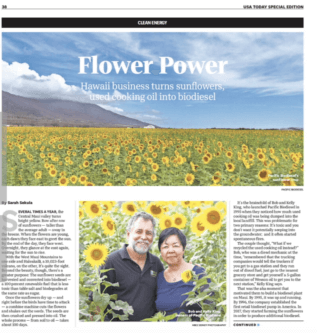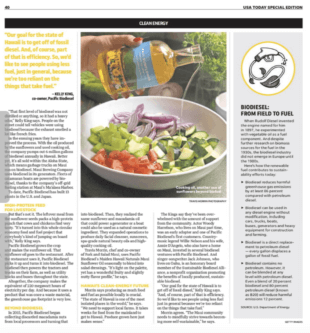By Sarah Sekula, published in USA TODAY’s Sustainability magazine
Several times a year, Maui’s central valley turns bright yellow. Row after row of sunflowers—taller than the average adult—sway in the breeze. When the flowers are young, each dawn they face east to greet the sun. By the end of the day they face west. Overnight, they glance at the east again, waiting for the sun to make a comeback.
With the West Maui Mountains to one side and Haleakala, a 10,023-foot volcano, on the other, it’s quite the sight. Beyond the beauty, though, there’s a greater purpose: The sunflower seeds are harvested and converted into biodiesel—a 100 percent renewable fuel that is less toxic than table salt and biodegrades at the same rate as sugar.
Here’s the low down: Once the sunflowers dry up (and right before the birds have time to attack), a combine machine cuts the flowers and shakes out the seeds. The seeds are then crushed and pressed into oil. The whole process—from soil to oil—takes about 100 days.
It’s the brainchild of Bob and Kelly King who launched Pacific Biodiesel in 1995 when they noticed how much used cooking oil was being dumped into the local landfill; not good because 1) it’s toxic and you don’t want it potentially seeping into the groundwater and 2) the cooking oil often started spontaneous combustible fires.
The couple thought, what if we recycled the used cooking oil instead? Bob, who was a diesel mechanic at the time, “remembered that the trucking companies would tell the truckers if you get to a gas station and they run out of diesel fuel, just go to the nearest grocery store, and get yourself a five-gallon container of Wesson oil to get you to the next station,” Kelly King says.
That was the aha moment. They would build a biodiesel plant on Maui. By 1995, it was up and running. By 1996, the company established the first retail biodiesel pump in America. By 2017, they started farming the sunflowers in order to produce additional biodiesel.
“That first level of biodiesel was not distilled or anything, so it had a heavy odor,” Kelly King says. Everyone knew you were using biodiesel in your vehicle because it smelled a lot like French fries.
Fast forward to today, and they’ve perfected the process. With the oil produced by the sunflowers and the used cooking oil, the company pumps out 6 million gallons of biodiesel annually in Hawaii. Better yet, it’s all sold within the Aloha State, which means garbage trucks on Maui run on biodiesel. Maui Brewing Company uses biodiesel in its generators. Fleets of catamaran boats are powered by biodiesel thanks to the company’s off-grid fueling station at Maui’s Ma‘alaea Harbor.
So far, they’ve built 13 plants in Hawaii, Japan and Alaska.
High-protein feed for livestock
But that’s not it. The leftover meal from the sunflower seeds packs a high-protein punch that cows and chickens find very tasty. “It’s turned into this whole circular economy food and fuel project that everybody’s kind of jumping on board with,” Kelly King says.
Here’s how it works: Pacific Biodiesel grows the crop and makes the sunflower oil. That sunflower oil goes to the restaurant. After the restaurant uses it, Pacific Biodiesel picks it up and turns it into biodiesel. The biodiesel then powers the tractors and trucks on their farm and also utility trucks and buses throughout the Aloha State.
Altogether, the company makes the equivalent of 250 megawatt hours of electricity per day. And because they use a product that was once a waste material, the greenhouse gas footprint is very low. A win-win, indeed.
Beyond biodiesel
In 2015, Pacific Biodiesel began collecting discarded macadamia nuts from local macadamia nut processors and turning that into biodiesel. Then, they realized the same sunflower and macadamia oil that could power a generator or a boat could also be used as a natural cosmetic ingredient. They expanded operations to produce daily facial cleanser, sunscreen, spa-grade natural beauty oils and high quality cooking oil.
Travis Morrin, chef and co-owner of Fork and Salad, uses the Maiden Hawaii Naturals Maui Sunflower Oil seasonally to blend into salad dressings. “It’s light on the palette, yet has a wonderful fruity and slightly nutty flavor profile,” he says.
Hawaii’s clean-energy future
Morrin says producing as much food and fuel locally is crucial. “The state of Hawaii is one of the most isolated places in the world,” he says. “We need to support local farms. It takes weeks for food from the mainland to get to Hawaii. Produce grown here just makes sense.”
The Kings say they’ve been overwhelmed with the amount of support from the community. Actor Woody Harrelson who lives on Maui part time, was an early adopter and one of Pacific Biodiesel’s first customers. Country-music legend Willie Nelson and his wife, who also have a home on Maui, invested in several biodiesel ventures with Pacific Biodiesel. And Jack Johnson, who lives on Oahu, is an honorary board member of the Sustainable Biodiesel Alliance, a non-profit organization promoting the benefits of locally produced, sustainable biodiesel.
“Our goal for the state of Hawaii is to get off of fossil diesel,” Kelly King says. “And, of course, part of that is efficiency. So we’d like to see people using less fuel just in general because we do we’re too reliant on the things that take fuel.”
Morrin agrees: “The Maui community needs to mindfully strive towards becoming more self sustainable,” he says.


